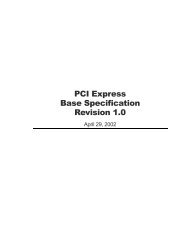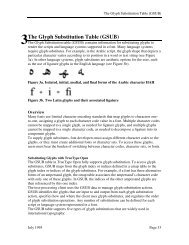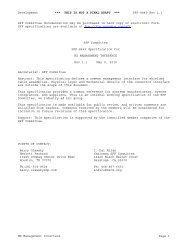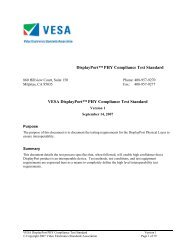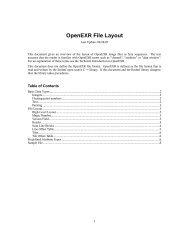SCSI Primary Commands - 2.pdf
SCSI Primary Commands - 2.pdf
SCSI Primary Commands - 2.pdf
- No tags were found...
Create successful ePaper yourself
Turn your PDF publications into a flip-book with our unique Google optimized e-Paper software.
T10/1236-D Revision 20 18 July 2001A page format (PF) bit of one specifies that the SEND DIAGNOSTIC parameters and any parameters returned by afollowing RECEIVE DIAGNOSTIC RESULTS command shall conform to the page structure as specified in thisstandard. See 8.1 for the definition of diagnostic pages.A PF bit of zero indicates that all SEND DIAGNOSTIC parameters are vendor specific. If the content of thePARAMETER LIST LENGTH field is zero and the SEND DIAGNOSTIC command will not be followed by a correspondingRECEIVE DIAGNOSTIC RESULTS command then the PF bit shall be zero. The implementation of the PFbit is optional.A self-test (SELFTEST) bit of one directs the device server to complete the target’s default self-test. If the self-testsuccessfully passes, the command shall be terminated with GOOD status; otherwise, the command shall be terminatedwith CHECK CONDITION status and the sense key shall be set to HARDWARE ERROR.A SELFTEST bit of zero requests that the device server perform the diagnostic operation specified by the SELF-TESTCODE field or in the parameter list. The diagnostic operation might or might not require the device server to returnparameter data that contains diagnostic results. If the return of parameter data is not required, the return of GOODstatus indicates successful completion of the diagnostic operation. If the return of parameter data is required, thedevice server shall either:a) perform the requested diagnostic operation, prepare the parameter data to be returned and indicatecompletion by returning GOOD status. The application client issues a RECEIVE DIAGNOSTIC RESULTScommand to recover the parameter data; orb) accept the parameter list, and if no errors are detected in the parameter list, return GOOD status. Therequested diagnostic operation and the preparation of the parameter data to be returned are performedupon receipt of a RECEIVE DIAGNOSTIC RESULTS command.A UNITOFFL bit of one grants permission to the device server to perform diagnostic operations that may affect theuser accessible medium on the logical unit (e.g., write operations to the user accessible medium, or repositioningof the medium on sequential access devices). The implementation of the UNITOFFL bit is optional. A UNITOFFL bitof zero prohibits any diagnostic operations that may be detected by subsequent tasks. When the SELFTEST bit iszero, the UNITOFFL bit shall be ignored.A DEVOFFL bit of one grants permission to the device server to perform diagnostic operations that may affect all thelogical units on a target (e.g., alteration of reservations, log parameters, or sense data). The implementation of theDEVOFFL bit is optional. A DEVOFFL bit of zero prohibits diagnostic operations that may be detected by subsequenttasks. When the SELFTEST bit is zero, the DEVOFFL bit shall be ignored.The PARAMETER LIST LENGTH field specifies the length in bytes of the parameter list that shall be transferred from theapplication client to the device server. A parameter list length of zero indicates that no data shall be transferred.This condition shall not be considered an error. If the specified parameter list length results in the truncation of oneor more pages (PF bit set to one) the device server shall return CHECK CONDITION status with a sense key ofILLEGAL REQUEST and an additional sense code of INVALID FIELD IN CDB.NOTE 36 To ensure that the diagnostic command information is not destroyed by a command sent from anotherinitiator, either the SEND DIAGNOSTIC command should be linked to the RECEIVE DIAGNOSTIC RESULTScommand or the logical unit should be reserved.160 dpANS <strong>SCSI</strong> <strong>Primary</strong> <strong>Commands</strong> - 2 (SPC-2)



![[MS-DFSRH]: DFS Replication Helper Protocol Specification](https://img.yumpu.com/51326226/1/190x245/ms-dfsrh-dfs-replication-helper-protocol-specification.jpg?quality=85)
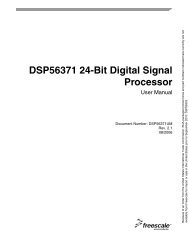
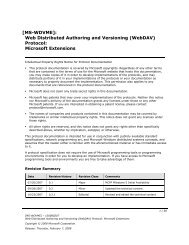
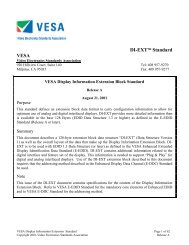
![[MS-VDS]: Virtual Disk Service (VDS) Protocol Specification](https://img.yumpu.com/50743814/1/190x245/ms-vds-virtual-disk-service-vds-protocol-specification.jpg?quality=85)
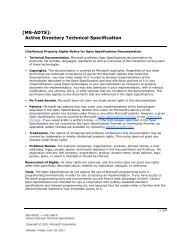
![[MS-GPSI]: Group Policy: Software Installation Protocol Extension](https://img.yumpu.com/50703911/1/190x245/ms-gpsi-group-policy-software-installation-protocol-extension.jpg?quality=85)
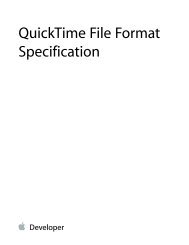
![[MS-GPPREF]: Group Policy: Preferences Extension Data Structure](https://img.yumpu.com/50206932/1/190x245/ms-gppref-group-policy-preferences-extension-data-structure.jpg?quality=85)
